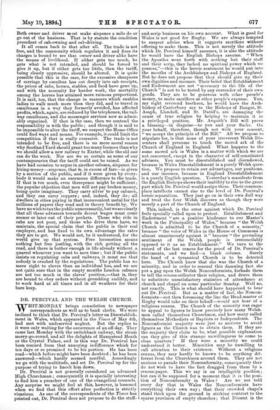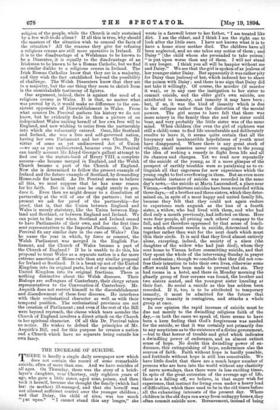DR. PERCIVAL AND THE WELSH CHURCH.
WHIT-MONDAY brings consolation to newspaper correspondents as well as to bank clerks. We were inclined to think that Dr. Percival's letter on Disestablish- ment in Wales, which appeared in the Times of May 4th, had met with undeserved neglect. But the replies to it were only waiting for the occurrence of an off-day. They came last Monday with the switchback railway, the steam merry-go-round, and all the delights of Hampstead Heath or the Crystal Palace, and in this way Dr. Percival has been rescued from that annoying indifference which for ten days or so promised to be his portion. He has been read—which before might have been doubted ; he has been answered—which hardly seemed needful. Accordingly we go with the multitude, and set Dr. Percival up for the , purpose of trying to knock him down. Dr. Percival is not generally considered an advanced High Churchman ; consequently it is specially interesting to find him a preacher of one of the evangelical counsels. Any surprise we might feel at this, however, is lessened when we find that this effort after perfection is strictly vicarious. As one of the correspondents of the Times has pointed out, Dr. Percival does not propose to do the staff- and-scrip business on his own account. What is good for Wales is not good for Rugby. We are always tempted to suspect advice when it suggests sacrifices without offering to make them. This is not merely the attitude which Dr. Percival himself assumes, it is also the attitude he would have the English Bishops assume. 'When the Apostles went forth with nothing but their staff and their scrip, they lacked no spiritual power which we possess,"—this is the heroic sentiment he would put into the mouths of the Archbishops and Bishops of England. But he does not propose that they should give up their own dignities and incomes. Their belief that Establishment and Endowment are not "necessary to the life of the Church" is not to be tested by any surrender of their own goods. They are to be generous with other people's money, to make sacrifices at other people's expense. You, my right reverend brethren, he would have the Arch- bishop of Canterbury say to the Bishops of Bangor, St. Asaph, Llandaff, and St. David's, are damaging the cause of true religion by helping to -maintain it in a privileged position. Mr. Asquith's Bill will prove a blessing—in disguise—to you and your flocks. On your behalf, therefore, though not with your consent, "we accept the principle of the Bill." All we propose to stipulate for, is that none of your irreverent Welsh Dis- senters shall presume to touch the sacred ark of the Church of England in England. What happens to the same sacred ark in Wales is a matter with which we are not concerned, except in the character of self-constituted advisers. You must be disestablished and disendowed, because in Wales Disestablishment is a purely Welsh ques- tion. We propose to retain our advantages, our positions, and our incomes, because in England Disestablishment is a purely English question. Yesterday's manifesto from the English Bishops shows their inability to rise to the great part which Dr. Percival would assign them. Their common- place intellects cannot rise to the level of Dr. Percival's heroic separatism. They just go on in their own dull way and treat the four Welsh dioceses as though they were merely a part of the Church of England.
This, indeed, is the error against which Dr. Percival feels specially called upon to protest. Establishment and Endowment "are a positive hindrance to our Master's work in the Principality of Wales," because "the Welsh Church is admitted to be the Church of a minority," because "the voice of Wales in the House of Commons is almost unanimously against it" because "the prevailing sentiment of the Welsh people is irreconcilably opposed to it as an Establishment." We turn to the record of the last census for the proof of Dr. Percival's statements, and we find—a blank column. Surely the hand of a. tyrannical Church is to be detected here. The Church knew that she was the Church of a minority, and in order to conceal this damning fact she put a gag upon the Welsh Nonconformists, forbade them to tell the census-collector their religion, and drove them to substitute unsatisfactory statistics of attendance at church and chapel on some particular Sunday. Well no, not exactly. This is what should have happened to bear out Dr. Percival. But as a matter of fact, the Noncon- formists—not then foreseeing the line the Head-master of Rugby would take on their behalf—would not hear of a, religious census. The Church of the minority was eager to appeal to figures to know precisely how many Welsh- men called themselves Churchmen, and how many called themselves Methodists or Baptists or Independents. The Nonconformist majority were just as anxious to avoid figures as the Church was to obtain them. If they are the majority they claim to be, what possible explanation can they give of this strange unwillingness to come to close quarters ? If they were a minority we could understand it better. Minorities may be unwilling to call attention to their existence. Without a religious census, they may hardly be known to be anything dif- ferent from the Churchmen around them. They are not anxious to parade their Nonconformity, consequently they do not wish to have the fact dragged from them by a census-paper. This we say is an intelligible position ; but can it be supposed for a moment that it is the posi- tion of Nonconformity in Wales ? Are we not told every day that in Wales the Nonconformists have everything their own way ; that their crowded chapels stand thick upon the ground in striking contrast to the sparse provision of empty churches ; that Dissent is the religion of the people, while the Church is only sustained by a few well-to-do aliens ? If all this is true, why should the masters of the situation wish to conceal the facts of the situation ? All the reasons they give for refusing a religious census are still more operative in Ireland. If it is to the disadvantage of a Welshman to be known to be a Dissenter, it is equally to the disadvantage of an Irishman to be known to be a Roman Catholic, but we find no similar dislike to a religious census in Ireland. The Irish Roman Catholics know that they are in a majority, and they wish the fact established beyond the possibility of challenge. The Welsh Dissenters know that they are in a majority, but the one thing they seem to shrink from is the unmistakable testimony of figures. One argument, indeed, there is against the need of a religious census in Wales. It is that, no matter what was proved by it, it would make no difference to the con- sistent opponents of Disestablishment in Wales. From what sources Dr. Percival gathers his history we do not know, but he evidently finds in them a picture of an independent Wales uniting herself of her own free will to England, and now wishing to retire from the partnership into which she voluntarily entered. Once, like Scotland and Ireland, she was a free and self-governed nation, having her own Parliament and her own Church. By virtue of some as yet undiscovered Act of Union —we say as yet undiscovered, because even Dr. Percival can hardly account Mr. Lloyd George's gallant attempt to find one in the statute-book of Henry VIII. a complete success—she became merged in England, and the Welsh Church became a part of the Church of England. Now she is determined to follow the present example of Ireland and the future example of Scotland, by demanding Home-rule for herself. As Dr. Percival seems to believe all this, we must suppose that he has some reason for his faith. But in that case he ought surely to pro- duce it. Even then we might demur to a dissolution of partnership at the -will of one of the partners ; but at present we ask for proof of the partnership—for proof, that is, that the Union between England and Wales is merely statutory, like the Union between Eng- land and Scotland, or between England and Ireland. We can point to the year when Scotland and Ireland ceased to have Parliaments of their own, and for the first time sent representatives to the Imperial Parliament. Can Dr, Percival fix any similar date in the case of Wales ? Can he name the year in which, by force or consent, the Welsh Parliament was merged in the English Par- liament, and the Church of Wales became a part of the Church of England ? If he is unable to do this, his proposal to treat Wales as a separate nation is a far more extreme assertion of Home-rule than any similar proposal for Ireland or Scotland. It is a break up not of the United Kingdom into its original parts, but of one member of the United Kingdom into its original fractions. There is nothing distinctive about the Welsh dioceses. Their Bishops are suffragans of Canterbury, their clergy return representatives to the Convocation of Canterbury. Mr.
Asquith does not restrict himself to the disestablishment and disendowment of these four dioceses. He interferes with their ecclesiastical character as well as with their temporal position. The ecclesiastical provinces are not the creation of Parliament ; and even if the rest of the Bill were beyond reproach, the clause which tears asunder the Church of England involves a direct attack on the Church in her spiritual character. Of all this Dr. Percival takes no notice. He wishes to defend the principles of Mr. Asquith's Bill, and for this purpose he creates a nation and a Church which have no separate being outside his own fancy.







































 Previous page
Previous page